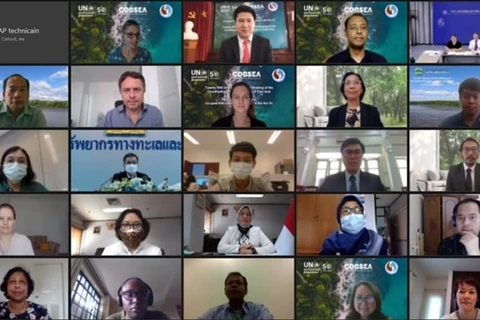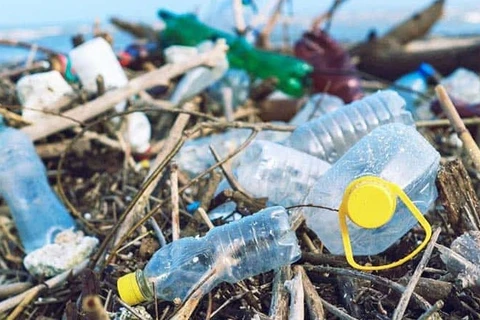Hanoi (VNA) - The Institute of Strategy and Policy on Natural Resources and Environment (ISPONRE) under the Ministry of Natural Resources and Environment, in collaboration with the Hanoi Department of Industry and Trade and the Vietnam Business for Environment (VB4E) Alliance, held a consultation session with retailers on stepping up the implementation of a communication plan on reducing plastic bags.
ISPONRE Deputy Director Nguyen Trung Thang said that with the aim of reducing the use of single-use plastic products at retailers, the institute and the Hanoi Department of Industry and Trade called for businesses to sign a commitment to join the alliance of retailers to reduce plastic bags and single-use plastic products.
As of July, 15 retailers had agreed to join this commitment. This is an activity within the framework of the “Rethinking Plastics - Circular Economy Solutions to Marine Litter” project funded by the European Union and the German Government. Expertise France is the organisation that will implement this project in Vietnam.
According to Thang, Vietnam uses about 104,000 single-use plastic bags per day, or 38 million plastic bags a year. Up to 46 out of 48 supermarkets are providing plastic bags free of charge, and each supermarket consumes about 1,454 plastic bags a day on average.
Vietnam aims to use 100 percent of environmentally-friendly plastic bags and packaging at shopping malls and supermarkets by 2025, according to a project on strengthening the management of plastic waste in Vietnam approved by Deputy Prime Minister Le Van Thanh on July 22.
Other goals include to collect, reuse, recycle and treat 85 percent of plastic waste; to halve the volume of plastic waste dumped to oceans; to have 100 percent of tourist complexes, hotels and other lodging facilities not use non-biodegradable plastic bags and single-use plastic products by 2025.
Additionally, the project will gradually cut the production and consumption of non-biodegradable plastic bags and single-use plastic products in daily life; while raising awareness among organisations, enterprises and the community about the harmful effects of single-use plastic items to the environment, ecosystem and human health, and encouraging consumers to shift away from single-use and non-biodegradable plastics to eco-friendly alternatives./.
ISPONRE Deputy Director Nguyen Trung Thang said that with the aim of reducing the use of single-use plastic products at retailers, the institute and the Hanoi Department of Industry and Trade called for businesses to sign a commitment to join the alliance of retailers to reduce plastic bags and single-use plastic products.
As of July, 15 retailers had agreed to join this commitment. This is an activity within the framework of the “Rethinking Plastics - Circular Economy Solutions to Marine Litter” project funded by the European Union and the German Government. Expertise France is the organisation that will implement this project in Vietnam.
According to Thang, Vietnam uses about 104,000 single-use plastic bags per day, or 38 million plastic bags a year. Up to 46 out of 48 supermarkets are providing plastic bags free of charge, and each supermarket consumes about 1,454 plastic bags a day on average.
Vietnam aims to use 100 percent of environmentally-friendly plastic bags and packaging at shopping malls and supermarkets by 2025, according to a project on strengthening the management of plastic waste in Vietnam approved by Deputy Prime Minister Le Van Thanh on July 22.
Other goals include to collect, reuse, recycle and treat 85 percent of plastic waste; to halve the volume of plastic waste dumped to oceans; to have 100 percent of tourist complexes, hotels and other lodging facilities not use non-biodegradable plastic bags and single-use plastic products by 2025.
Additionally, the project will gradually cut the production and consumption of non-biodegradable plastic bags and single-use plastic products in daily life; while raising awareness among organisations, enterprises and the community about the harmful effects of single-use plastic items to the environment, ecosystem and human health, and encouraging consumers to shift away from single-use and non-biodegradable plastics to eco-friendly alternatives./.
VNA
























